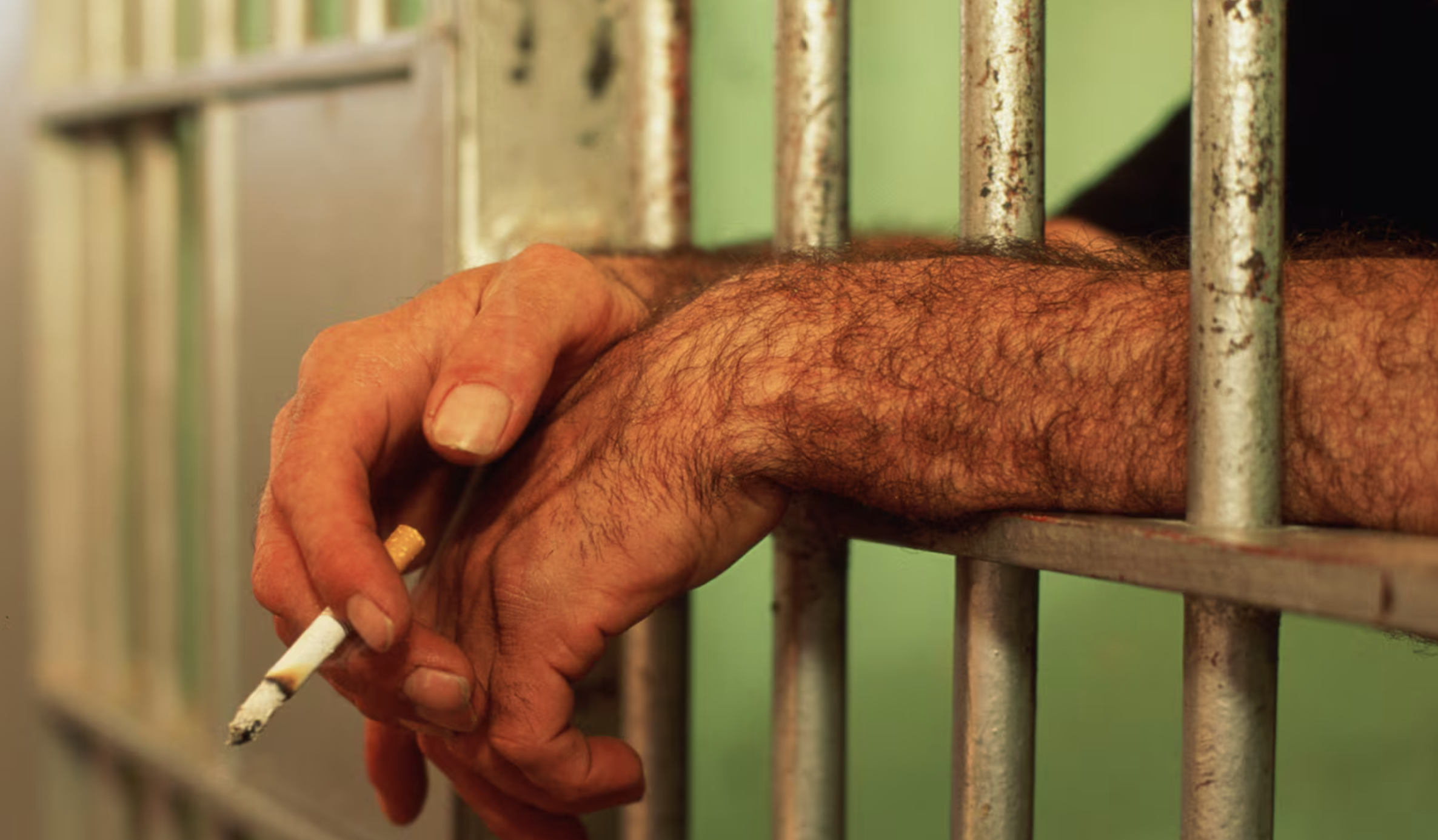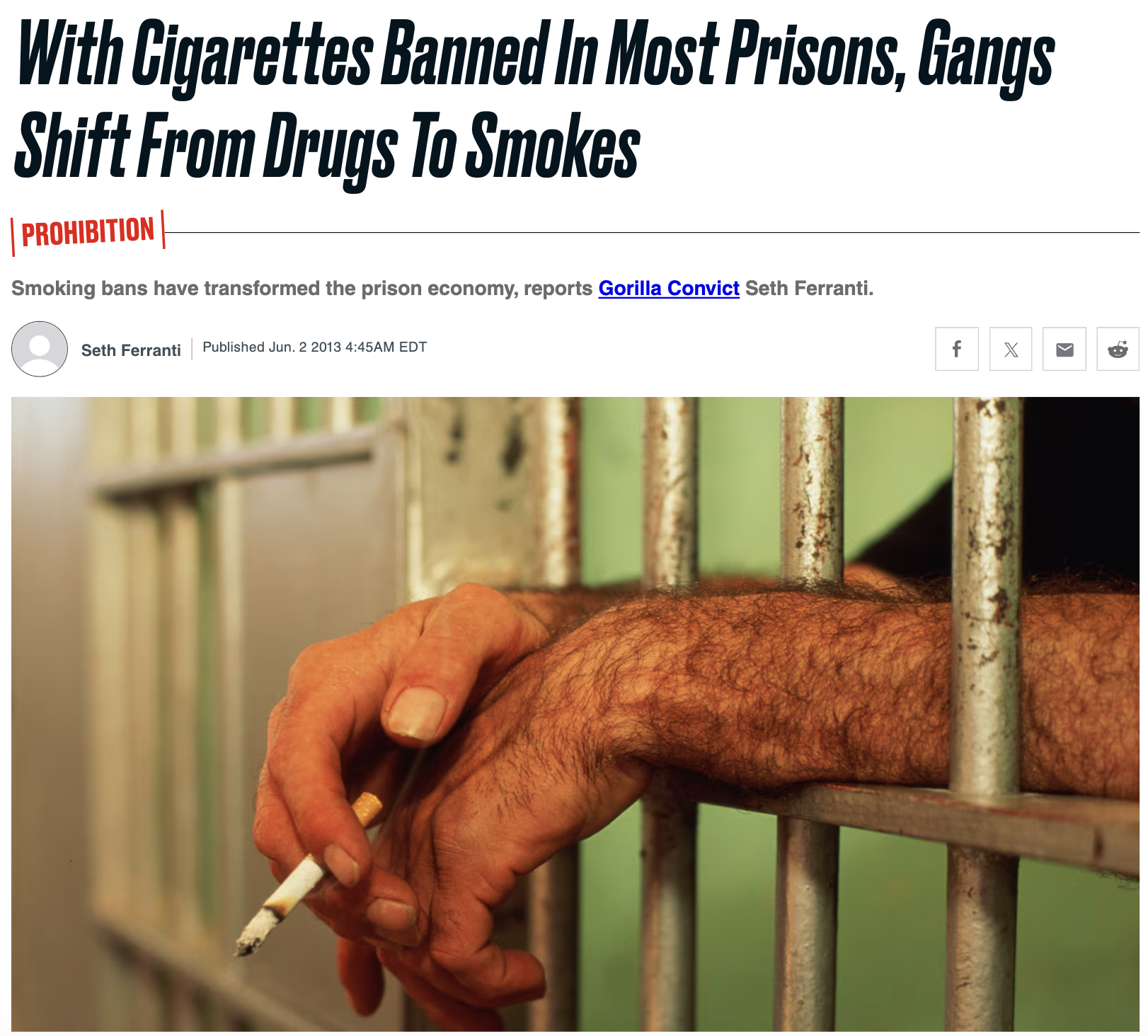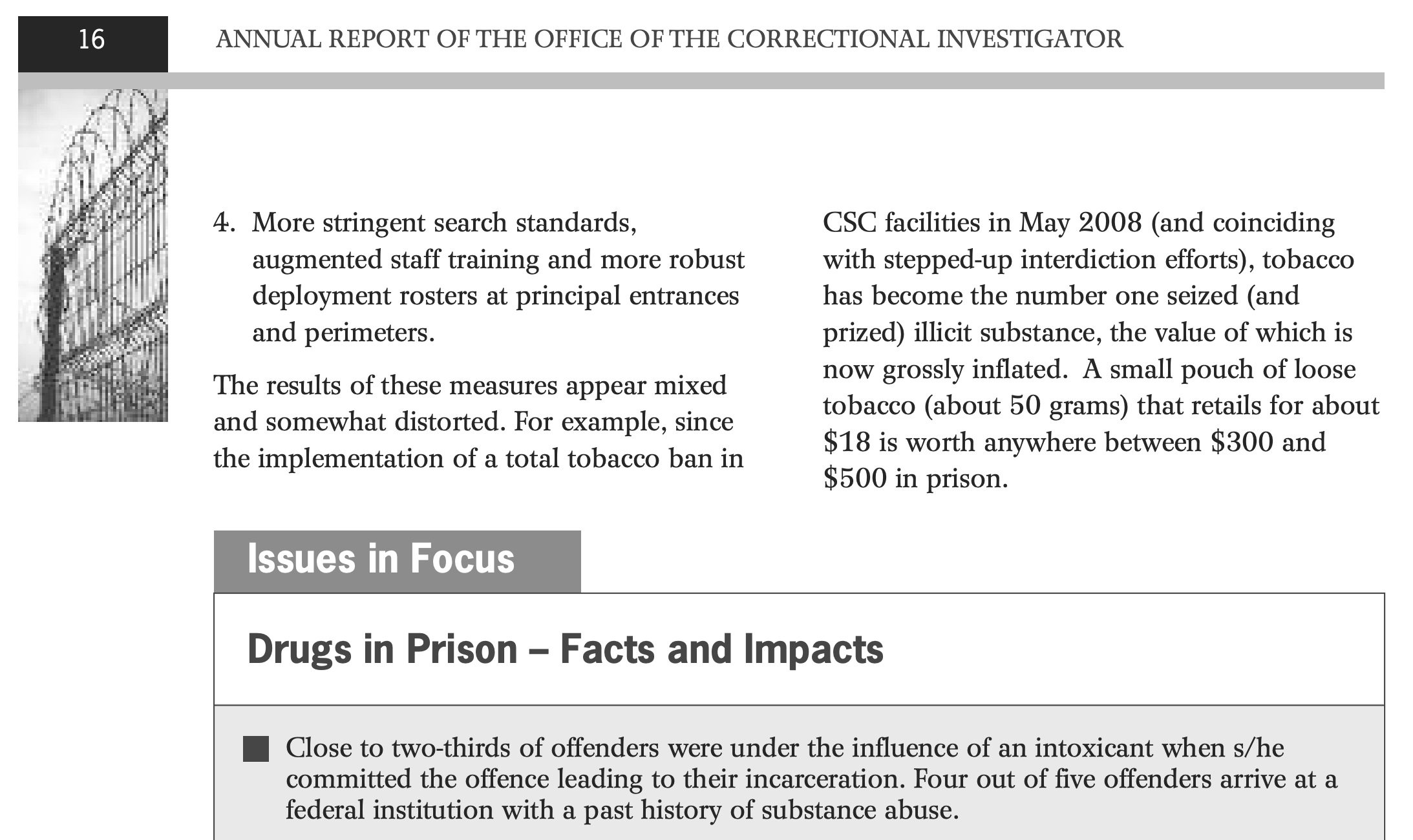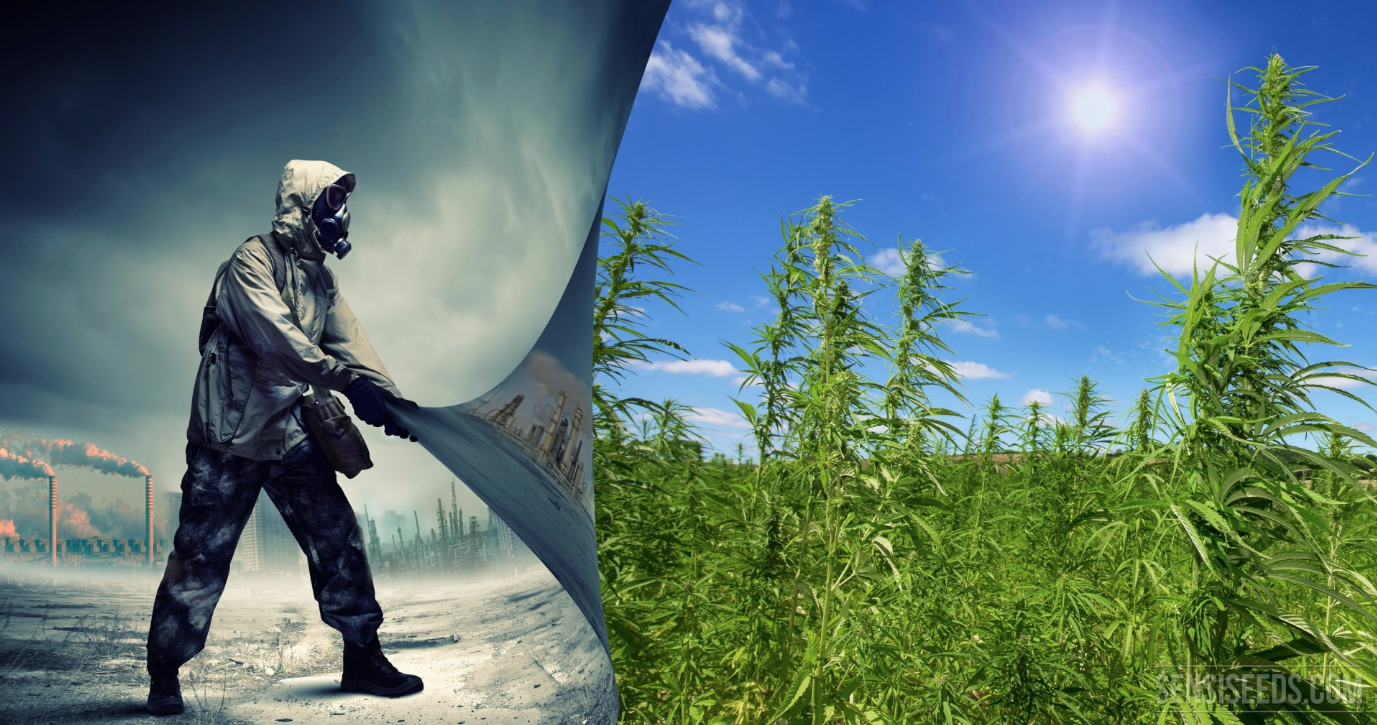Tobacco Prohibition at Fraser Regional Correctional Center

This article was written in Fraser but I chose to wait to publish it until after I was released – those who run the jail may not have taken my constructive criticism with a completely open mind. They might have taken my critique personally and they might have punished me in some way for it – but it’s not an attack on any one person or even an institution … it’s only an attack on one of the most bone-headed policies ever conceived by human beings within an institution. Despite the risks to self, I couldn’t help writing about it … because it’s an extreme example of everything that is wrong will all the other drug prohibitions.
Tobacco is forbidden to inmates across Canada. According to an article in the March 1st 2008 Province (Googled up by a kind guard) entitled “Smoking ban may spark chaos in Federal jails: Advocate”, smoking cigarettes outside was banned by Corrections Canada across the country after it was banned inside in 2006. Fraser Regional Correctional Center – the jail I was in – became BC’s first smoke-free prison back in 2000. According to the article, prisoners refused to work when the policy was first put in place and the prison was locked down.
The object of tobacco prohibition, one must assume, is to protect non-smokers from second-hand smoke and to force smokers to stop smoking. One might also surmise there is a desire on the part of those running the institution to deny inmates a product that has traditionally served as a form of currency … and to drive home the point that human autonomy – at least in prison – is non-existent.
The policy must be seen as a complete failure on every level. Fraser Regional is awash in tobacco. Every inmate returning from work is frisked, every incoming package is searched and frisk teams do random and target searches all the time – but you can smell the tobacco burning in the washrooms of minimum security – and individual rooms in maximum security – every day.

Image from https://www.thedailybeast.com/with-cigarettes-banned-in-most-prisons-gangs-shift-from-drugs-to-smokes/
I don’t know exactly how it keeps coming in … a prison guard who is selling it to pay off gambling debts … a package thrown over the fence … a visitor who slips it into the hand of a prisoner … a nurse who has become friendly with a certain inmate … a contractor who wishes to reward a certain prisoner for working hard … a maintenance worker who has been hired by an associate of a prisoner … a cigarette butt thrown away by a guard or a visitor in the parking lot or the “designated smoking area” that the outside work crew has access to … there must be a thousand different ways it can get in.
The policy backfires in it’s attempts to protect non-smokers. If smoking was limited to just the outside or a special smoking room us non-smokers wouldn’t have to breath it in. But because it is forbidden everywhere, smoking most often occurs in the washroom (in minimum security) so the smokers can avoid detection – and the second hand smoke becomes unavoidable for us. Luckily I never had a cellmate in maximum who smoked or I may have been subjected to way more second-hand smoke than I could deal with.
Almost every week or so another guy gets sent from minimum to maximum because he got caught smoking. But even though there are video cameras almost everywhere and next to no privacy, and even though the punishment for getting caught is being sent to maximum security to be locked in your cell for most of the day – a punishment that is enough to scare violent people into acting non-violently, these things hardly put a dent into the numbers of smokers or the amount of smoking. I bet at least a full third of my unit smoked tobacco more than once per day. I’m guessing a few of them smoked 3 or 4 times per day.
The first thought that occurred to me as I witnessed this farce was … if jail guards can’t stop prisoners from smoking prohibited drugs 3 or 4 times per day inside maximum security jails, why does anyone think they can possibly stop anyone from smoking prohibited drugs OUTSIDE jails? Of course … getting people to stop smoking prohibited drugs is not the real reason for the policy (inside or out).
I know it sounds crazy … but maybe, just maybe, the real reason for the policy of drug prohibition is not to prohibit drugs but rather to give some people who have the power to smuggle drugs into a place of prohibition without being searched a certain amount of money and power while providing guards or police with an excuse to go to greater and greater lengths to deny all individuals privacy and autonomy. If that was the real reason … then tobacco prohibition and drug prohibition are both smashing successes – and could account for the continuation of a policy which, on the surface, appears as a dismal failure.
Compare tobacco prohibition with cocaine prohibition: Certain individuals – by virtue of their ability to cross borders without being subjected to inspection (the CIA, the DEA, the military, Ollie North etc etc) get the benefits of prohibition related pricing and invisible money generation and transfer while avoiding all of the risks other cocaine traffickers face.
Or take marijuana prohibition: Certain individuals, by virtue of them being owners of major pharmaceutical firms like Bayer or lucky contractors like Prairie Plant Systems get the benefit of prohibition-related pricing while avoiding all the risks other cannabis traffickers face.
As with cocaine and cannabis, tobacco prohibition benefits the few who have influence, while subjecting the rest of the users and dealers to unnecessary risks of punishment and unnecessary denial of human autonomy … and the innocent bystanders such as myself get caught in the crossfire.
After reading this stinging indictment of their policy, prison officials could do one of three things: they could 1) do nothing – ignore the obvious problems and continue with tobacco prohibition business as usual. This, I believe, is the most probable option. They could 2) crack down even harder on the inmates at Fraser and blame me – the messenger – for alerting them to a problem they were already fully aware of. Or they could 3) abandon their failed policy, retain an indoor smoking ban but allow smoking outside or in a special room (the “boot room” in maximum, for example) … perhaps if they are feeling particularly enlightened they would allow prisoners to grow their own tobacco organically, thus avoiding the radioactive chemical phosphate fertilizers that I suspect are responsible for most if not all of the tobacco-related cancers.
The third policy would not only be cheaper for the institution and healthier for the inmates, it would teach them gardening – an important skill for future employment and for the building of self esteem. Maybe one day there might even be a cannabis garden (oh how everyone in jail needs to just mellow the fuk out) … but that’s a long way off I know. The first step to that ideal situation is to stop pretending that tobacco prohibition works and to abandon the irrational policy … and Fraser Regional isn’t exactly overflowing in rational policies.
But I can still hope, can’t I? What’s the point of being set free if I’m not free enough to hope out loud?
For more on radioactive chemical fertilizers, check out these articles I wrote a while back:
http://www.cannabisculture.com/v2/articles/2673.html
http://www.cannabisculture.com/articles/2221.html
… and this research I collected:
http://forums.cannabisculture.com/forums/ubbthreads.php?ubb=showflat&Number=754311&page=1



